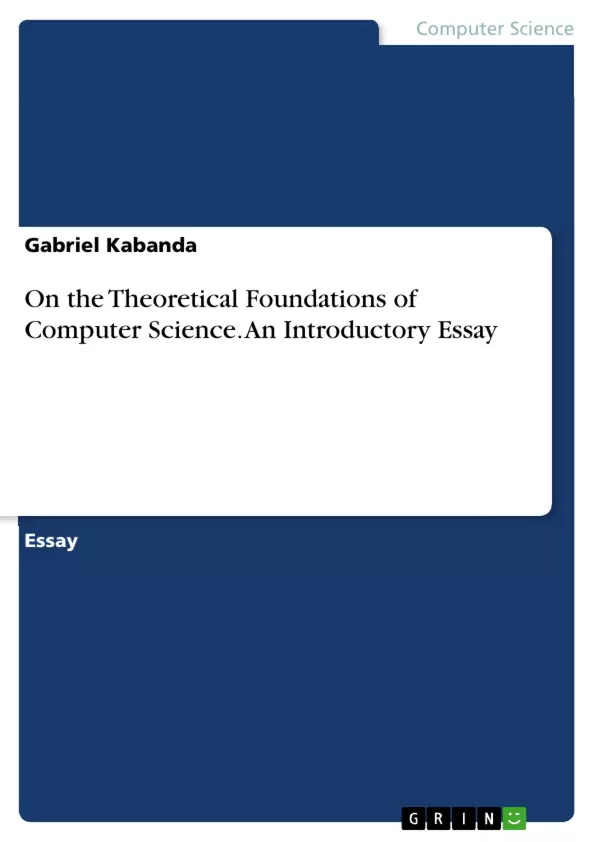The paper presents an analytical exposition, critical context and integrative conclusion on the discussion on the meaning, significance and potential applications of theoretical foundations of computer science with respect to Algorithms Design and Analysis, Complexity Theory, Turing Machines, Finite Automata, Cryptography and Machine Learning.
An algorithm is any well-defined computational procedure that takes some value or sets of values as input and produces some values or sets of values as output. A Turing machine consists of a finite program, called the finite control, capable of manipulating a linear list of cells, called the tape, using one access pointer, called the head. Cellular automata is an array of finite state machines (inter-related).
A universal Turing machine U is a Turing machine that can imitate the behavior of any other Turing machine T. Automata are a particularly simple, but useful, model of computation which were were initially proposed as a simple model for the behavior of neurons. A model of computation is a mathematical abstraction of computers which is used by computer scientists to perform a rigorous study of computation. An automaton with a finite number of states is called a Finite Automaton (FA) or Finite State Machine (FSM).
The Church-Turing Thesis states that the Turing machine is equivalent in computational ability to any general mathematical device for computation, including digital computers. The important themes in Theoretical Computer Science (TCS) are efficiency, impossibility results, approximation, central role of randomness, and reductions (NP-completeness and other intractability results).
Inhaltsverzeichnis (Table of Contents)
- ABSTRACT
- Introduction
- A. Algorithms Design and Analysis
- Significance of Algorithms
- Application of Algorithms
- B. Complexity Theory
- Significance and Application of Complexity Theory
- C. Turing Machines
- Significance of Turing machines
- Application of Turing machines
- D. Finite Automata
- Significance and Application of Finite Automata
- E. Cryptography
- Significance of Cryptography
- Applications of Cryptography
- F. Machine Learning
- Significance of Machine Learning
- Applications of Machine Learning
- Conclusion
- References
Zielsetzung und Themenschwerpunkte (Objectives and Key Themes)
This paper provides a comprehensive overview of theoretical foundations in computer science, focusing on key concepts such as algorithms, complexity theory, Turing machines, finite automata, cryptography, and machine learning. The objective is to explore the meaning, significance, and potential applications of these concepts within the broader context of computer science.
- The importance of theoretical foundations in computer science
- The role of algorithms in computation and problem-solving
- The impact of complexity theory on computational efficiency
- The significance of Turing machines as a model of computation
- The applications of finite automata in various domains
Zusammenfassung der Kapitel (Chapter Summaries)
- Introduction: This chapter provides a general introduction to the theoretical foundations of computer science, highlighting the importance of these concepts and their relevance in contemporary computing.
- A. Algorithms Design and Analysis: This chapter explores the concept of algorithms, their significance in solving computational problems, and their role in modern technologies.
- B. Complexity Theory: This chapter discusses the importance of complexity theory in analyzing the efficiency of algorithms and understanding the limitations of computation.
- C. Turing Machines: This chapter focuses on Turing machines, a fundamental model of computation, exploring their significance and applications in computer science.
- D. Finite Automata: This chapter delves into the concept of finite automata, a simplified model of computation used to understand various computational problems and their limitations.
- E. Cryptography: This chapter examines the importance of cryptography in securing information and its applications in modern communication and data protection.
- F. Machine Learning: This chapter explores the field of machine learning, its significance in pattern recognition and decision-making, and its potential applications in various domains.
Schlüsselwörter (Keywords)
Key concepts and terms explored in this paper include: Algorithms, complexity theory, Turing machines, finite automata, cryptography, machine learning, computational efficiency, theoretical computer science, and model of computation.
Frequently Asked Questions
What are the theoretical foundations of computer science?
The foundations include algorithms, complexity theory, models of computation like Turing machines, finite automata, cryptography, and the mathematical principles of machine learning.
What is an algorithm in computer science?
An algorithm is a well-defined computational procedure that takes input values and produces output values through a series of logical steps.
What is a Turing Machine?
A Turing machine is a mathematical abstraction of a computer consisting of a finite program and a linear tape of cells used to study what can and cannot be computed.
What does the Church-Turing Thesis state?
It states that a Turing machine is equivalent in computational power to any general mathematical device or digital computer for computation.
Why is complexity theory important?
Complexity theory analyzes the efficiency of algorithms and helps scientists understand the limits of computation, such as NP-completeness and intractability results.
What are finite automata used for?
Finite automata are simple models of computation used for pattern recognition, designing digital circuits, and modeling the behavior of systems with a finite number of states.
- Quote paper
- Professor Gabriel Kabanda (Author), 2019, On the Theoretical Foundations of Computer Science. An Introductory Essay, Munich, GRIN Verlag, https://www.grin.com/document/491407



